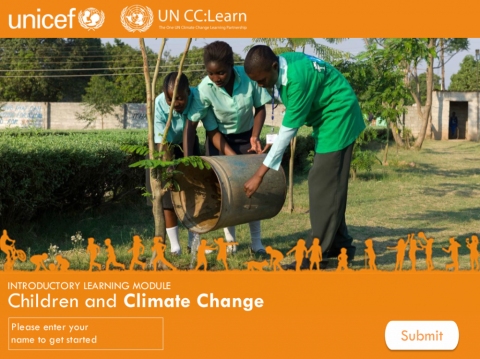
Children and Climate Change
IMPORTANT: Please register directly on the course website: http://unccelearn.org/
This specialized module introduces the theme of climate change and children, with the aim to provide a children’s perspective to the discussions on how to deal with this global crisis. The module will present how children are and can be impacted by climate change. It will then look at how children’s resilience to climate change could be strengthened and at the benefits that can be provided by mitigation measures. It will also discuss solutions, focusing on the empowerment of children as actors of change and on the key role of Governments in children’s protection. Several examples are provided to illustrate the concepts presented.
After completing this specialized module, participants will be able to:
- Explain how climate change can affect children.
- Describe how measures to build climate resilience and mitigate climate change can benefit children.
- Illustrate key instruments and good practices for empowering children to act on climate change.
- Identify opportunities for protecting children’s rights in a changing climate.
The course is structured by five modules:
- The Impact of Climate Change on Children
- Strengthening Children’s Resilience to Climate Change
- The Benefits of Climate Change Mitigation for Children
- Empowering Children to Act on Climate Change through Education
- A Climate Change Agenda for Children
The course should be of particular interest to the following audiences:
- Civil servants in national ministries, provincial departments and local authorities working in the field of climate change, children/youth and development.
- Private sector managers, practitioners, and representatives of development partners active in the area of climate change and/or children’s protection.
- Faculty, researchers and students.
- Interested citizens/youth/students.
UN CC:Learn is a partnership of more than 30 multilateral organizations supporting countries to design and implement systematic, recurrent and results-oriented climate change learning. At the global level, the partnership supports knowledge-sharing, promotes the development of common climate change learning materials, and coordinates learning interventions through a collaboration of UN agencies and other partners. At the national level, UN CC:Learn supports countries in developing and implementing national climate change learning strategies. Through its engagement at the national and global levels, UN CC:Learn contributes to the implementation of Article 6 of the UNFCCC on training, education and public awareness-raising, and the 2012-2020 Doha Work Programme. Funding for UN CC:Learn is provided by the Swiss Government and UN partners. The Secretariat for UN CC:Learn is hosted by the UN Institute for Training and Research (UNITAR).

